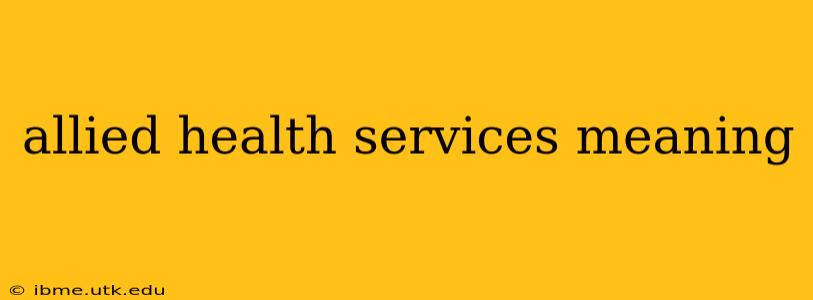Allied health services encompass a broad range of healthcare professions that work collaboratively with physicians and other healthcare providers to deliver comprehensive patient care. These services are crucial for maintaining and improving the health and well-being of individuals across the lifespan. But what exactly are allied health services, and what roles do these professionals play? This comprehensive guide will delve into the meaning, scope, and importance of allied health services.
What are Allied Health Professions?
Allied health professions are distinct from medicine and nursing, yet are integral to a holistic healthcare approach. They involve a diverse group of specialists who provide diagnostic, therapeutic, and preventative healthcare services. This intricate network of professionals plays a vital role in managing acute and chronic illnesses, promoting healthy lifestyles, and enhancing the quality of life for patients of all ages.
What Types of Services are Included in Allied Health?
The range of services offered is extensive and constantly evolving. Here are some key areas:
-
Rehabilitation Services: This includes physical therapy (PT), occupational therapy (OT), speech-language pathology (SLP), and respiratory therapy. These professionals focus on restoring function, improving mobility, and enhancing communication and swallowing skills after illness or injury.
-
Diagnostic Services: Medical laboratory technicians, radiologic technologists, and diagnostic medical sonographers are crucial for accurate diagnosis. They perform tests and imaging procedures, providing critical information for treatment planning.
-
Therapeutic Services: This encompasses a broad spectrum, including dietetics and nutrition, recreational therapy, and art therapy. These professionals assist patients in managing their health through lifestyle modifications, emotional support, and creative expression.
-
Support Services: Medical assistants, health information technicians, and emergency medical technicians provide essential administrative, clinical, and emergency support, ensuring the smooth operation of healthcare facilities.
What are Some Examples of Allied Health Professionals?
To further clarify, let's look at specific examples of allied health professionals and their roles:
- Physical Therapists (PTs): Help patients recover from injuries and illnesses through exercise, manual therapy, and other interventions.
- Occupational Therapists (OTs): Assist individuals to participate in daily activities through adaptations and skill development.
- Speech-Language Pathologists (SLPs): Diagnose and treat communication and swallowing disorders.
- Respiratory Therapists (RTs): Provide respiratory care and manage breathing disorders.
- Medical Laboratory Scientists: Conduct tests on blood and other bodily fluids to aid in diagnosis and disease monitoring.
- Registered Dietitians (RDs): Provide nutritional guidance and counseling to manage health conditions and promote well-being.
How Do Allied Health Professionals Collaborate?
Effective collaboration is the cornerstone of allied health. Professionals often work as part of a multidisciplinary team, sharing information and coordinating care to achieve optimal patient outcomes. This collaborative approach ensures that patients receive holistic care that addresses all aspects of their health needs.
What is the Importance of Allied Health Services?
The impact of allied health services is substantial:
- Improved Patient Outcomes: Allied health professionals significantly contribute to better health outcomes through early intervention, prevention, and rehabilitation.
- Reduced Hospital Stays: Efficient and effective allied health interventions often help patients recover faster, reducing the need for prolonged hospital stays.
- Enhanced Quality of Life: Allied health professionals empower patients to manage their conditions and improve their overall quality of life.
- Cost-Effectiveness: Preventive and early intervention services offered by allied health professionals can prevent costly complications and hospitalizations down the line.
What is the Difference Between Allied Health and Medicine?
While both fields are crucial to healthcare, allied health professionals typically require different educational pathways and have different scopes of practice compared to physicians. Physicians (MDs and DOs) diagnose and treat illnesses and injuries, often prescribing medication. Allied health professionals support this process through specialized services that address various aspects of patient well-being.
What are the career prospects in Allied Health?
The demand for allied health professionals is consistently growing, fueled by an aging population and increasing prevalence of chronic diseases. This translates into excellent career prospects with a wide variety of specializations and employment settings.
This comprehensive overview should provide a clearer understanding of the meaning and importance of allied health services. The diverse roles and collaborative nature of these professions are critical for providing high-quality, patient-centered healthcare.
